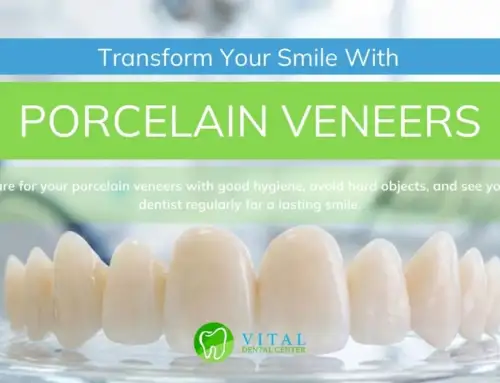A dazzling smile is a powerful asset, boosting confidence and making a great first impression. Yet, chipped, cracked, discolored, or misaligned teeth can hold you back from achieving your brightest grin.
Fortunately, modern dentistry offers solutions like dental veneers and dental crowns to address these concerns. Both procedures can dramatically improve your smile’s aesthetics and function. But with some key differences, choosing the right option can feel overwhelming.
Key Differences Between Dental Veneers vs Dental Crowns
| Basis | Dental Veneers | Dental Crowns |
|---|---|---|
| Purpose | Dental veneers are primarily used for cosmetic enhancements. They are designed to improve the appearance of teeth by covering imperfections such as stains, discoloration, chips, and minor misalignments. Veneers can also enhance teeth’ size, shape, and symmetry, creating a more aesthetically pleasing smile. | Dental crowns serve both functional and cosmetic purposes. They are used to restore and protect teeth significantly damaged due to decay, trauma, or other issues. Crowns provide structural support to weakened teeth and can improve their appearance by covering extensive damage or abnormalities. |
| Amount of Tooth Reduction | Dental veneers require minimal tooth reduction since they only cover the tooth’s front surface. This preserves more natural tooth structure and minimizes the invasiveness of the procedure. | Dental crowns often require more extensive tooth reduction compared to veneers. This is because crowns encase the entire visible portion of the tooth above the gum line, necessitating the removal of more enamel to accommodate the crown. |
| Coverage | Veneers cover only the front surface of the tooth, also known as the facial or labial surface. They are bonded to the enamel using dental adhesive, effectively concealing imperfections and enhancing the appearance of the teeth. | Dental crowns cover the entire visible portion of the tooth above the gum line. They encapsulate the tooth like a cap or crown, providing comprehensive coverage and protection. Crowns can be made from various materials, including porcelain, ceramic, metal, or a combination of these materials. |
| Durability | Dental veneers are generally durable and can last many years with proper care. However, they may be susceptible to chipping or fracturing if subjected to excessive force or trauma. | Dental crowns are known for their strength and durability. They provide significant reinforcement to weakened or damaged teeth, making them less prone to fracture or breakage. With proper maintenance, crowns can last for a decade or more, depending on the material used and the patient’s oral hygiene habits. |
| Treatment Process | The placement of dental veneers typically requires two dental visits. During the first visit, the dentist prepares the teeth by removing a small amount of enamel to accommodate the veneers. Impressions of the teeth are then taken, and temporary veneers may be placed. In the second visit, the permanent veneers are bonded to the teeth using dental adhesive, and any necessary adjustments are made to ensure a comfortable fit and natural appearance. | The process of getting dental crowns usually involves two to three dental visits. In the initial visit, the tooth is prepared by removing any decayed or damaged tissue and shaping it to fit the crown. Impressions of the prepared tooth are then taken, and a temporary crown may be placed while the permanent crown is fabricated in a dental laboratory. During the final visit, the permanent crown is cemented onto the tooth, and any adjustments are made to ensure proper fit and bite alignment. |
How Much Do Dental Veneers vs Dental Crowns Cost?
Veneers and crowns can incur significant costs, which can vary based on several factors, including the size and location of the tooth, as well as prevailing prices in your geographic area.
Cosmetic dental procedures, such as veneers and crowns, often fall outside the coverage provided by most dental insurance plans. Additionally, many dental insurance policies enforce an annual limit on coverage. It’s advisable to consult with your insurance provider to ascertain the extent of coverage available to you.

How Much Do Dental Veneers Cost?
As reported by the American Cosmetic Dentistry organization, the cost of veneers typically ranges from $925 to $2,500 per tooth.
Porcelain veneers, while pricier than composite veneers, offer greater longevity according to the Consumer Guide to Dentistry. Composite veneers generally range in price from $250 to $1,500 per tooth.
How Much Do Dental Crowns Cost?
The cost of a crown can vary depending on factors such as the material used, the extent of preparatory work required, and the size of the tooth.
Consumer Guide to Dentistry indicates that crowns can cost between $1,000 to $3,500 per tooth. This estimate does not include additional procedures like core buildup or root canals, which may be necessary prior to crown placement.
Porcelain and ceramic crowns are typically slightly more expensive compared to all-metal crowns.
Book Your Appointment with Vital Dental Center in Margate, FL
Considering a brighter smile but confused between dental veneers vs dental crowns? At Vital Dental Center in Margate, FL, our team of dentists can help! Veneers are perfect for enhancing the look of your front teeth by fixing chips, discoloration, or minor misalignment. Crowns offer a complete solution, repairing damaged teeth and restoring their strength.
Schedule an appointment with Vital Dental Center today and discover your perfect smile!
FAQs
Unlike crowns, veneers are a minimally invasive procedure. This means they typically don’t require significant drilling or reshaping of your natural tooth. Additionally, veneers can be custom-colored to seamlessly blend with your existing teeth, creating a very natural look.
The location of the crown in your mouth significantly impacts its lifespan. While some crowns last a lifetime, others may crack and require replacement. With proper care, a crown typically lasts between 10 and 30 years.
While both veneers and crowns can improve your smile, they differ in how much of the tooth they cover. Veneers are like thin shells that bond to the front surface of your tooth, leaving the rest untouched. On the other hand, crowns encase the entire tooth, making them ideal for situations with significant damage or large fillings.



